6 Worst Lawn Weeds in Jacksonville (and How to Get Rid of Them)
BY LAUREN BRYANT | AUGUST 6TH, 2019 | FLORIDA, JACKSONVILLE, LAWN CAREPicture this: You’ve gone outside to enjoy a sunny Jacksonville day when you notice something odd on your lawn. It sure doesn’t look like the rest of your grass, and upon closer inspection, you may notice dying turf near it. You’ve stumbled upon a weed, but what should you do about it?
The best way to deal with these leafy intruders is to identify them so you can create an appropriate game plan. Let’s learn about some of the worst Jacksonville weeds so you can grab the right tools and get your lawn back to normal.
In this article, we’ll cover:
Why Are Weeds Bad for Your Jacksonville Lawn?
Weeds compete for the water, nutrients, and sun your turfgrass needs. Left unaddressed, they can spread over your lawn, garden, and neighboring properties.
Besides the competition for resources, weeds are usually a sign of something wrong. Overwatering is one of the most common problems that encourage weed growth. However, it also may be that your turf isn’t getting the nutrients it needs or is mowed too low to reach a healthy density.
Ways to Control Weeds in Your Jacksonville Lawn
You may feel torn about what weed control method to try first. When choosing between manual and chemical control, you’ll need to consider time, effectiveness, and environmental concerns.
Hand Weeding
Removing weeds by hand is the most eco-friendly method. However, it can take a lot of time, especially if you have more than a few weeds. You must pull up all plant parts to effectively remove weeds by hand. Many weeds can grow back from roots or tubers left in the ground.
Here are some tips to keep in mind:
- Remove weeds while they are young before they have bloomed or developed complex root systems
- Be sure to remove the entire weed, including roots, rhizomes, tubers, or bulbs
- Use a screwdriver or dandelion fork to help remove weeds with a taproot, like dandelions or spotted spurge
Weed Control Chemical Treatments
Herbicides are specially-formulated products designed to eliminate weeds.
- Pre-emergent herbicide: Kills seeds before germination, preventing weeds from popping up in your yard
- Post-emergent herbicide: Targets weeds you can see, disrupting growth and killing them
- Iron-based herbicide: Specifically targets broadleaf weeds
Selective herbicides target specific plants, such as grassy or broadleaf weeds. On the other hand, non-selective herbicides kill plants more indiscriminately.
Always read herbicide labels carefully to avoid hurting you, your lawn, or your pets.
6 Most Common Lawn Weeds in Jacksonville
1. Crabgrass (Digitaria spp.)
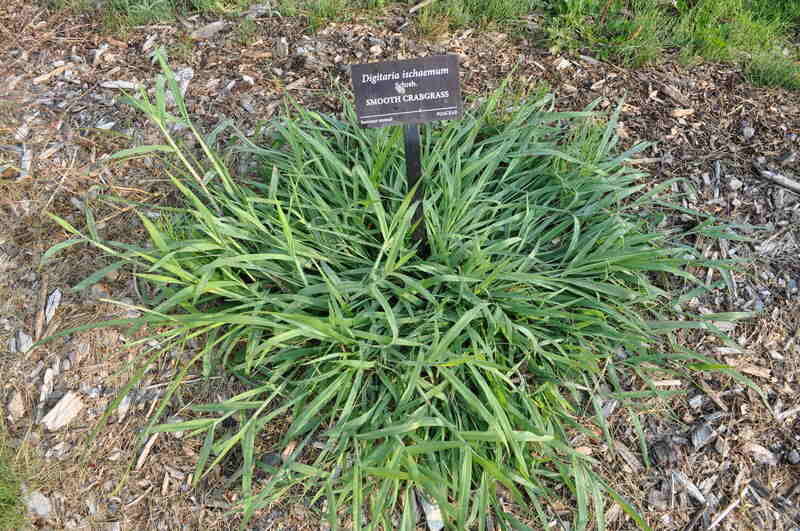
Photo Credit: NY State IPM Program at Cornell University / Flickr / CC BY 2.0
This weed can be tricky to spot, but you’ll see it everywhere once you recognize it. It resembles turfgrass but is often a lighter green with broader leaves. Crabgrass gravitates toward bare patches in your lawn. It germinates in spring and dies in fall, leaving brown patches and making your lawn’s color uneven.
Crabgrass can show up on any lawn. The best way to keep it at bay is to choose an appropriate grass type for Jacksonville. Keep your lawn thick and healthy with proper maintenance, so there are no bare spots for crabgrass to invade. If prevention doesn’t work, apply pre-emergent herbicides in early March before temperatures are consistently above 65 to 70 degrees to avoid harming your turfgrass.
Plant type: Annual grass
USDA hardiness zone: 3-11
Habitat: Prefers dry soil
Danger: None
Removal method: Pre-emergent herbicides
2. Dollarweed (Hydrocotyle spp.)
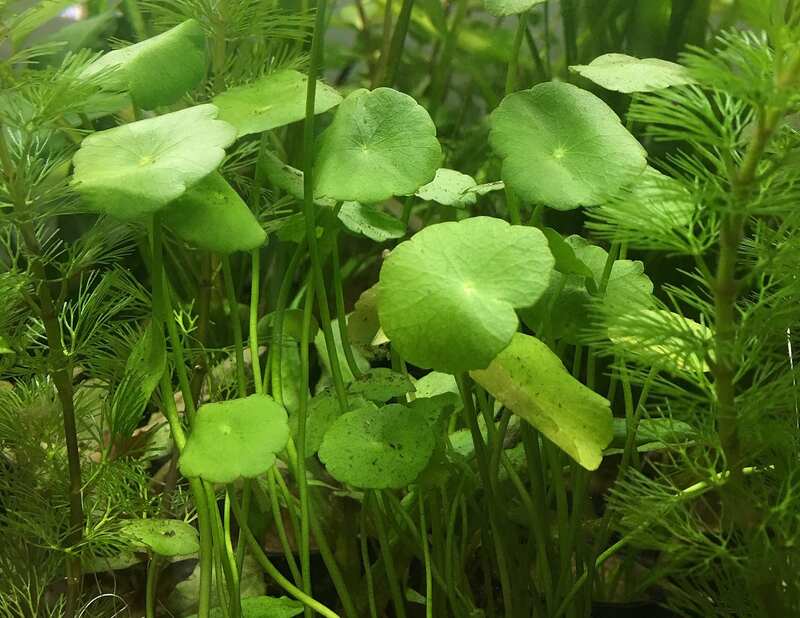
Photo Credit: Ranjith-chemmad / Wikimedia Commons / CC BY-SA 4.0
A rose by any other name would smell just as sweet, but this weed is just as annoying whether it’s called dollarweed or pennywort. The coin-themed names come from the size and round shape of the leaves. Dollarweed is low to the ground and spreads with seeds, rhizomes, and the occasional tuber. Its small white flowers can bloom year-round.
Dollarweed can thrive in many soil types, with or without sun, but prefers moist soil. To discourage this weed, avoid overwatering your lawn and improve drainage. Once you spot them, pull them out by hand or use selective or non-selective herbicides. Ensure you pull out all the white rhizomes, or it might make a comeback.
Plant type: Perennial broadleaf
USDA hardiness zone: 4A-10A
Habitat: Tolerates sandy, loam, or clay soils with acidic to neutral pH
Danger: None
Removal method: Hand-pulling, pre-emergent herbicides, or post-emergent herbicides
3. Dandelion (Taraxacum spp.)

Photo Credit: Pixabay
Dandelions are some of the most iconic weeds. They’re easy to spot once they have their signature yellow flowers or fluffy white seedheads. Your inner child may want to blow those seeds away and make a wish, but resist the temptation — you’d only be spreading them around your yard and neighborhood. These plants are best dealt with before they produce seeds.
The best way to prevent dandelions is to keep your turf dense and healthy, so there’s no room for them. Hand pulling isn’t a very effective removal method because it has deep roots, but it may be feasible in small yards.
Apply pre-emergent herbicides before dandelions germinate when soil temperatures are below 50 degrees Fahrenheit. Spot treat with broadleaf herbicides but avoid triclopyr because it can harm the warm-season turfgrasses in Jacksonville.
Plant type: Broadleaf perennial herb
USDA hardiness zone: 3-10
Habitat: Tolerates most soils
Danger: Low; dandelions are edible unless you have a latex allergy
Removal method: Broadleaf herbicide
4. Goosegrass (Eleusine indica)
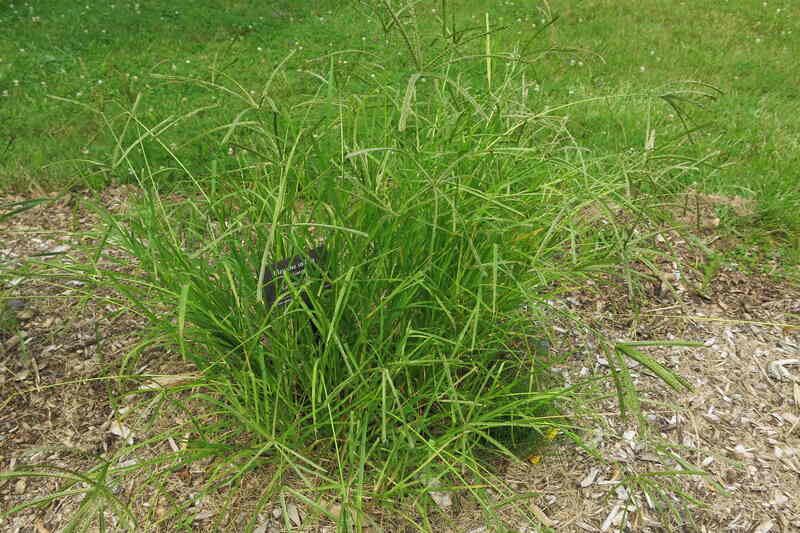
Photo Credit: NY State IPM Program at Cornell University / Flickr / CC BY 2.0
Also called wiregrass or crowfootgrass, goosegrass gets its name from finger-like spikes that pop out from the same spot when it flowers. Before it reaches that point, it will be low-growing in matted, grass-like clumps with a white leaf sheath at the base. Because of its growth pattern, it survives low mowing remarkably well.
Goosegrass grows so aggressively in thin lawns it might give you goosebumps. Its favorite soils are compact and wet, so aeration may help make your yard less welcoming. Need to break out the herbicides? You can use pre- or post-emergent herbicides with ingredients like dithiopyr, oryzalin, pendimethalin, or prodiamine.
Plant type: Summer annual
USDA hardiness zone: 8-11
Habitat: Prefers compact, wet soils
Danger: None
Removal method: Pre- or post-emergent herbicides
5. Chamberbitter (Phyllanthus spp.)
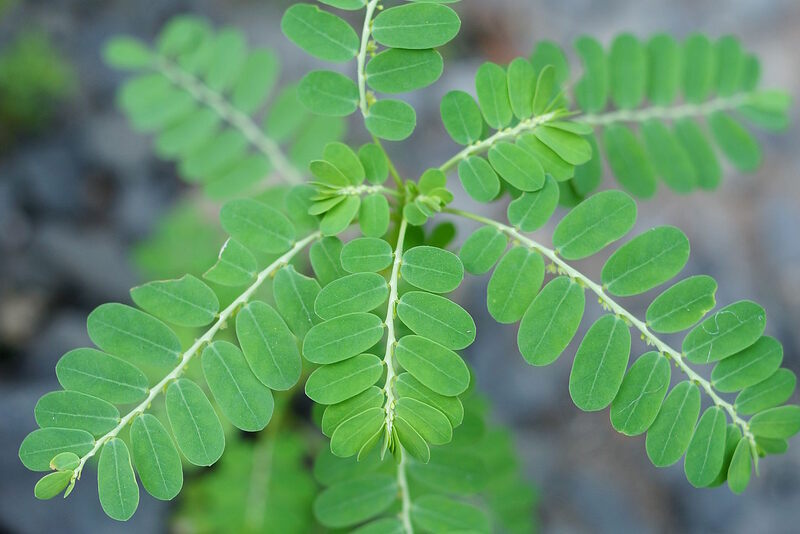
Photo Credit: Prenn / Wikimedia Commons / CC BY-SA 3.0
This invasive plant will leave you bitter if it takes over your Jacksonville lawn. Chamberbitter has small, round leaves on long stems with bursting pods that launch seeds everywhere. It looks similar to the powderpuff mimosa, a native groundcover in Florida. Two kinds are found in the Sunshine State – long-stalked chamberbitter (Phyllanthus tenellus) and the smaller gripeweed (Phyllanthus urinaria).
Gripeweed loves moist, overwatered soils and can survive even when mowed 2 inches high. This weed germinates from early summer to early fall. You can pull out these weeds by hand, but don’t shake the roots before tossing them in the trash — you could accidentally spread their seeds.
Young chamberbitter can be controlled by pre- or post-emergent herbicide, but older, woody specimens may need two or three applications to die back. Apply pre-emergent applications in April to get ahead of germination and seed spreading. Be cautious applying post-emergent herbicides to centipedegrass and St. Augustinegrass, since they also may be harmed.
Plant type: Summer annual broadleaf
USDA hardiness zone: 8A-10A
Habitat: Prefers warm soils
Danger: Non-toxic
Removal method: Pre-emergent herbicides work best, but you also can use post-emergent or hand-pulling
6. Sedges (Cyperus spp.)
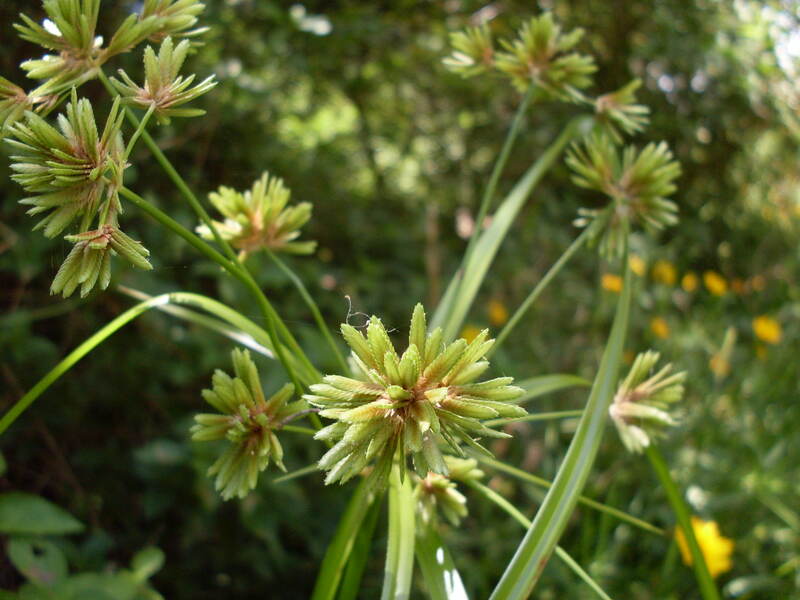
Photo Credit: John Tann / Flickr / CC BY 2.0
Sedges may look like grass, but you can identify these weeds by the angular shape of their stems. Yellow nutsedge (Cyperus escuelentus) and purple nutsedge (Cyperus rotundus) can be identified by their small flowers when in bloom. Summer is the season they’re at their peak, but they can grow year-round in temperate Florida.
Sedges attack lawns without well-established root systems. Avoid overwatering and excessive foot traffic to address the root problem, then try removal. Nutsedges spread with tubers on their roots, making them difficult to remove by hand. Check periodically to see if they grow back. You may need to repeatedly treat this weed with herbicides.
Plant type: Perennial
USDA hardiness zone: 8A-10B for yellow nutsedge and 3A-10B for purple nutsedge
Habitat: Tolerates most types, but prefers moist soils
Danger: Non-toxic
Removal method: Hand-pulling and herbicides
FAQ on the Most Common Lawn Weeds in Jacksonville
Dandelion weeders are a popular tool for weed removal in lawns and gardens. You also can use garden hoes.
While you can kill individual weeds, the war with weeds will never end. A gust of wind or an animal passing through could bring new weed seeds with them. However, preventative methods like pre-emergent herbicides and proper lawn maintenance give you the best chance of avoiding sprouted, visible weeds.
It depends on what your lawn goals are. If you want a picturesque lawn, no. Weeds will always compete with your grass and create an inconsistent appearance, if not patches and brown spots.
However, one man’s trash is another man’s treasure. A weed is only a weed if it’s unwanted or threatens something desirable. Several weeds are beneficial to Florida’s ecosystem. Thus, some homeowners choose to have a wild, less manicured lawn to be eco-friendly.
If this is the route you want to go, research your options thoroughly. Simply letting your lawn grow unattended isn’t necessarily going to create a natural utopia. You will likely need to actively cultivate some native plants and eliminate any invasive species that try to return. Your yard will become lower-maintenance once fully established.
Professional Weed Control for Your Jacksonville Landscape
You’ll need a vigilant eye and a dedicated lawn care regime to keep your lawn weed-free. If you’d rather not give up your weekend outing to Riverside Park, consider hiring a Jacksonville lawn care professional to do the dirty work. A pro can identify weeds quickly and has the best products on the market to eliminate them for good.
Main Image Credit: Pixabay